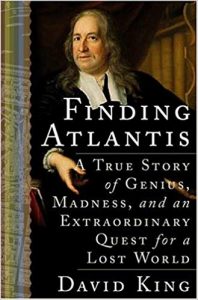Finding Atlantis
Finding Atlantis, A True Story of Genius, Madness, and an Extraordinary Quest for a Lost World, by David King. Published by Three Rivers Press, an Imprint of the Crown Publishing Group, New York, 2005.
Finding Atlantis is a 309-page book about Olof Rudbeck (Swedish, 1630-1702). The author writes that when Rudbeck was around the age of forty he began making careful studies of the old maps of Scandinavia, and he threw himself into the new world he was envisioning, Atlantis. “The lost world of Atlantis, Rudbeck was growing convinced, had actually been in Sweden! Its capital was in fact just outside the university, in a place called Old Uppsala.”
“Many Greek and Latin writers had recorded impressions about the Hyperboreans, and a number of Swedish thinkers had started to wonder if this enigmatic nation might have been located in the far north of Sweden.” Olof Rudbeck had no doubt about it.
The young Olof is described by the author as an almost inexhaustible optimist. He studied music, medicine, anatomy and dissection, and in 1655 he was offered a position with the medical faculty of the Uppsala University. He designed and helped construct a large university building, an arena-like Theatrum anatomicum or “anatomy theater.” He is today credited with the discovery of the lymphatic system (although a contemporary had made the discovery at the same time). Through his interest in plant life he created a large botanical garden, a work he regarded as a privilege. The garden is still in existence today in Uppsala and is known as the Linnaeus Garden, after a student of Olof Rudbeck the Younger, Carl Linnaeus. Rudbeck’s “measurements of the age of old monuments and graves by the thickness of the humus accumulated over them… anticipated the methods of modern archaeology.”
In keeping with his prosperous life, Olof married Vendela Lohrman, and according to the author’s Notes, this was by all accounts a happy marriage and the couple were blessed with seven children.
By July of 1670, however, the university began having serious financial problems, and Rudbeck, then a full professor and the rector of the university, was heavily criticized by his colleagues for his excesses, e.g., the size of the anatomy theater, and his increasingly costly search to prove that Plato’s Atlantis was in Sweden. There was also serious opposition to Rudbeck’s recognition of Cartesianism (René Descartes, 1596-1650, died in Stockholm). Rudbeck’s interest in Descartes would seem to indicate that he was not a man out of his time, nor was he losing his faculties in the Hyperborean mists. More »
